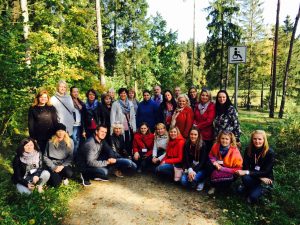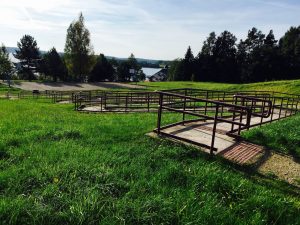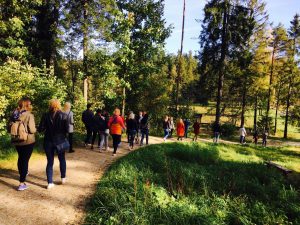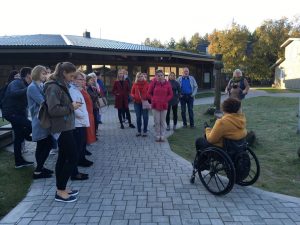
During the visit to Žemaitija National Park, the participants met with the representatives of the Park administration, who provided information on the activities of the Park, the main data, visitor attendance and development plans. There are 32 permanent employees at the Park, during the summer season several additional are being employed together with the students and freelancers. The maintenance of the nature objects in the Park is mainly carried out by the district municipality. There are the so called “voluntary tickets” introduced at Lithuanian parks, which means that visitors may voluntarily pay for visiting the park. At Žemaitija National Park, the participants also had a chance to visit the Plateliai lake viewing platform, which is being reconstructed within the scope of the UniGreen project and which is constructed in a way to be accessible for people with disabilities. The participants could also hike the Šeires nature trail, which is made both, of gravel and stone cover, as well as of wooden pathway, and which is basically adapted for people in wheelchairs.
At Salantai Regional Park, the participants visited the Medinis Lentu takas, which served as a good example on how important is the trail maintenance issue. The trail was built in 2008./2009. as adjusted for people with disabilities. Unfortunately, by this moment, due to lack of maintenance funding, the wooden trail foundation has been dilapidated, the boards are unstable, some of them are broken or rotten, thus at present the trail can not be considered as adjusted for disabled people and its reconstruction will require significant investments. At Salantu Dvaro Park, in its turn, the participants had a chance to observe a demonstrative example on how inappropriately the descent has been built along the stairs edge dedicated to be used for baby strollers, bicycles and wheelchairs. There were no handrails installed along the descents and the descent inclination was so steep, that in practice it can not be used for the dedicated purpose.
The water tourism infrastructure, in its turn, was pointed out by participants as a good practice to be learned. During the visit, the participants assessed the information signs installed on the Minija river banks, which are both, stable from the infrastructure installation point of view, clearly understandable for those who sail in the river, providing indication on stops, resting areas, number of km, activities allowed at stops (e.g. if it is allowed to make a camp fire).
During the visit to the Japanese garden, the participants had discussions with the owner of the Park, who told about the foundation of the park, its development and management from the private sector’s viewpoint.
On the second day, the participants visited a non-governmental organisation – Center for Disabled People Monciškes, which is adjusted for people in wheelchairs and provides resting and accommodation services, as well as helps to adopt and provides training to those, who have recently suffered from serious injuries and traumas and have become disabled. The Center provides both, practical training for adaptation, as well as train disabled people on legal and financial issues. All employees at the Center, except for the cleaner, are people with disabilities. There has been a collapsible wooden trail installed linking the Center with the sea coast, which gives the possibility for people in wheelchairs to access the sea.
On the second day the participants also visited the Kretinga Tourism Information Center, as well as assessed the nature objects’ accessibility at Pajūrio and Nemuno Delta Regional Parks. At several of the nature objects visited, partial accessibility has been provided, for example, the Olandu kepures skardis trail, where people in wheelchairs can use the trail, yet a companion would be advisable, since there are too wide intervals between the wooden boards at some of the trail sections, which encumbers the riding of trail sections in question. The Ornithological Station in Ventes ragas at Nemuno Delta Regional Park demonstrated a good example on how the environment can be adjusted for people with disabilities.
Overall, the participants acknowledged that the visit allowed both, to learn the good examples on providing nature tourism accessibility, as well as to learn also from mistakes and examples that require improvements. The Ornithological Station in Ventes ragas at Nemuno Delta Regional Park and Center of Disabled People in Monciškes should be highlighted as good examples learned. The other objects allowed to critically assess, what has been done inappropriately and what improvements should be made to facilitate the access. At the nature parks visited in Lithuania, the accessibility is mainly directed towards people in wheelchairs. None of the objects visited (except for the Ornithological Station in Ventes ragas) had any information in Braille script or audio format, yet at Žemaitija National Park, it has been planned to install infprmation in Braille on the Plateliai lake viewing platform. The main conclusion the participants emphasized is that when contructing a trail or another object, representatives of non-governmental organisations and other institutions working with disabled people should be invited and discussions and practical trials should be held. Only with the help of their advise and experience the best solutions can be applied.
The experience exchange visit has been organised with support of the Interreg Latvia-Lithuania Cooperation Programme within the framework of the project No. LLI-010 “Nature Tourism for All” (UniGreen).
The above reflects author’s views and the Managing Authority of Latvia-Lithuania Programme is not liable for any use that may be made of the information contained there in.
Information prepared by:
Alise Lūse
UniGreen Project Manager
Kurzeme Planning Region
Tel.: + 371 26567874, alise.luse@kurzemesregionslv





